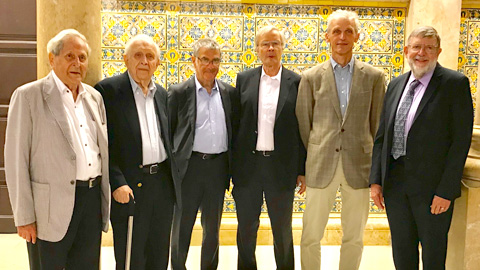Barcelona hosts the International Conference on Atomic Physics

23/07/2018
From 22 to 27 July, the city of Barcelona plays host to the 26th International Conference on Atomic Physics, the ICAP 2018, the most important conference of its kind which brings together scientists from around the world. This year's edition includes the presence of six Nobel laureates in Physics: Claude Cohen-Tannoudji, William D. Phillips, Wolfgang Ketterle, Roy J. Glauber, Theodor W. Hänsch and Serge Haroche.
Organised jointly by the Universitat Autònoma de Barcelona, the ICFO, the University of Barcelona, and the Universitat Politècnica de Catalunya, the conference is being held at the Barcelona Palau de Congressos and includes experts from around the world, who will be sharing results and opinions on atomic physics, and delving deeper into issues such as quantum computation and communication, quantum gases, atomic clocks and quantum metrology, intense fields and ultrafast science, etc.
The first ICAP conference was held in 1968 and since then it has been positioning itself to become today one of the leading conferences worldwide. Every two years conference participants have the opportunity to share and discuss new discoveries in the field of atomic physics, a research field which since its beginnings managed to evolve unexpectedly and open a whole new world with regards to the understanding of the atomic structure, the generation of laser light, the development of cooling and trapping techniques for atoms and ions, as well as making Bose–Einstein condensates and degenerate Fermi gases.
This year and parallel to the main conference, the ICAP has organised two special events for both conference attendants and the public in general:
- Round Table Discussion with 6 Nobel Laureates: to be held on 24 July at 6 p.m., it will include the participation of six Nobel laureates who will discuss their views on the tendencies in the field and successes they recently accomplished, as well as any possible discoveries to be made in the near future. The Nobel laureates participating in this session are: Claude Cohen-Tannoudji (NP in 1997 for the development of methods to cool and trap atoms with laser light), William D. Phillips (NP 1997 for the development of methods to cool and trap atoms with laser light), Wolfgang Ketterle (NP 2001 for the achievement of Bose-Einstein condensation in dilute gases of alkali atoms), Roy J. Glauber (NP 2005 for his contribution to the quantum theory of optical coherence), Theodor W. Hänsch ( NP 2005 for his contributions to the development of laser-based precision spectroscopy, including the optical frequency comb technique), and Serge Haroche (NP 2012 for ground-breaking experimental methods that enable measuring and manipulation of individual quantum systems).
- Presentation of "The New SI" by William D. Phillips and Vanderlei Bagnato: is the second event to be held on Thursday 26 July at 7:30 p.m., with the presence of Nobel Laureate William Phillips and Dr Vanderlei Bagnato. They will offer a presentation of "the new International System of Units (SI)", which will be put into effect in 2019 and in which the four base units used currently: kilogram, ampere, kelvin, and mole will be redefined in terms of constants of nature. The new definitions will be based on fixed numerical values of the Planck constant (h), the elementary charge (e), the Boltzmann constant (kB), and the Avogadro constant (NA), respectively. In this public lecture, they will explain what this means and why it is important, and will offer some demonstrations as to how some of these new definitions will be put into practice. It is made possible by support from the Ignacio Cirac - Fundació Catalunya - La Pedrera Chair at ICFO and from Fundació Cellex.
According to conference organisers Maciej Lewenstein, Veronica Ahufinger and Bruno Juliá-Díaz, "the ICAP is the most important conference on atomic physics. The results discussed at this event represent the very best in modern research, both in fundamental frontiers and in technological challenges".
More information at:
http://icap2018.eu/